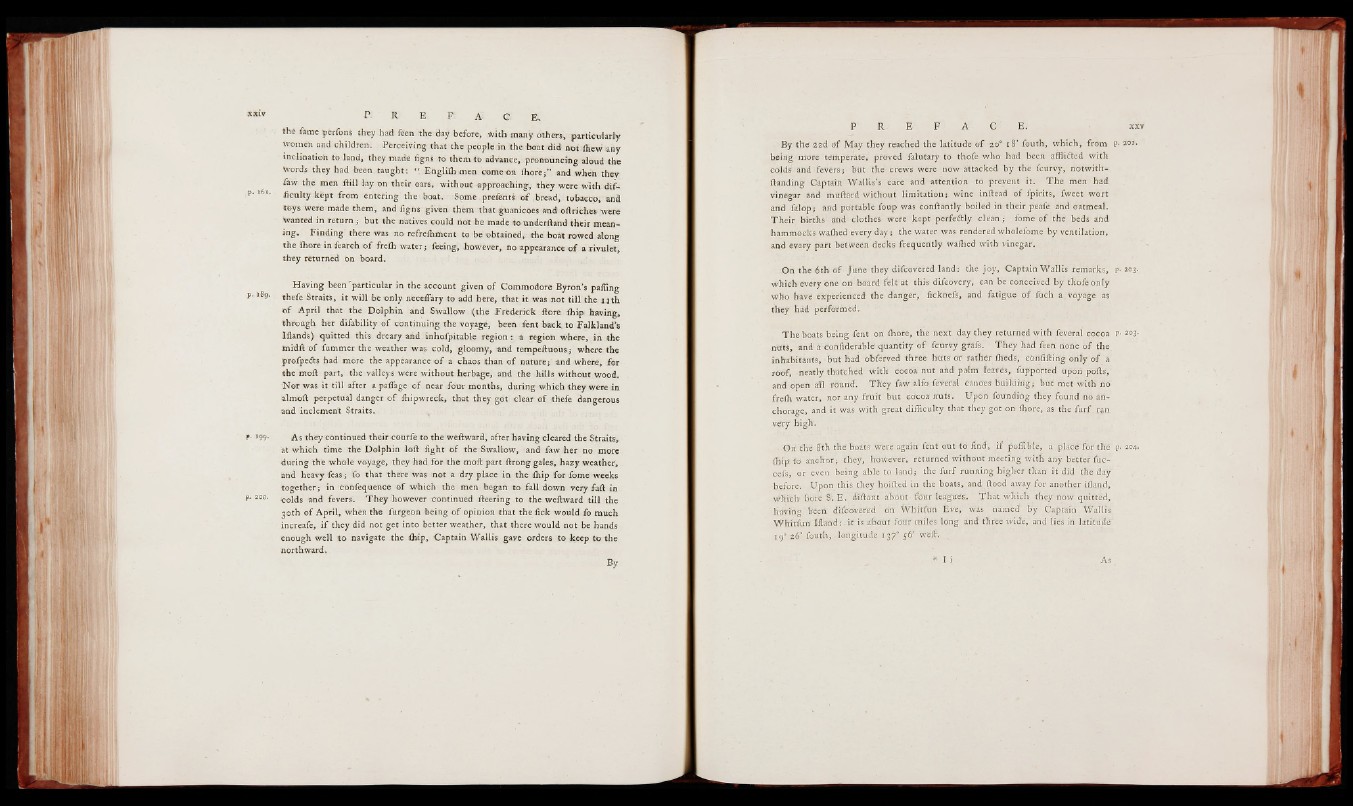
xxiv
p. 161.
p.-1% .
p- *99-
P R. E F. a : G Es
thé fame përfonfc they had fëen the day before, widh many others particularly
women and children. Perceiving that the people in the boat did not ihew any
inclination to land, they made fignè to them to advance, pronouncing aloud the
Words they had been taught-*. “ Efigiiïhinen come on ihore;” and when they
iaw thé men ftiil lay on their oars, without -approaching, they were with difficulty
kept from entering the boat. Some prefenti of bread, tobacco, and
toys were made them, and figns given them that güanicoes and oft riches were
Wanted in return ; but the natives could not be made to underftand their meaning.
Finding there was no refreihment to be obtained, the boat rowed along
the iffiore in fearch of freîh water; feeing, however, no appearance of a rivulet,
they returned bn board.
Having been "particular in the account given of Commodore Byron’s pafling
thefe Straits, it will be only necefFàry to add here, that it was not till the n th
o f April that the Dolphin and Swallow (the Frederick flore ihip having,
through her difability of continuing the voyage, been fent back, to Falkland’s
1 Hands) quitted this dreary and inhospitable region ï a region where, in the
midft of fummer the weather was cold, gloomy, and tempeiluous; where the
profpefts had more the appearance of a chaos ithan o f nature; and where, for
the moil part, the valleys were without herbage, and the hills without wood.
Nor was it till after a paflage of near four months, during which they were in
almoft perpetual danger of fhipwreck, that they got clear o f thefe dangerous
and inclement Straits.
As they Continued their courfe to the weftward, after having cleared the Straits,
at Which time the Dolphin loft fight of the Swallow, and law her no more
during the whole voyage, they had for the moil part ftrong gales, hazy weather,
and heavy feas ; fo that there was not a dry place in the ihip for fome weeks
together; in conièqüence of which the men began to fall down very faft in
colds and fevers. They however continued fleering to the weftward till the
30th of April, when the furgeon being of opinion that the fick would fo much
increafe, i f they did not get into better weather, that there would not be hands
enough well to navigate the ihip, Captain Wallis gave orders to keep to the
northward.
By
By the 22d of May they reached the latitude of 20° 18’ fouth, which, from P- 201 •
being more temperate, proved falutary to thofe who had been afflidled with
colds• and fevers; but the creWs were now attacked by thé fcürVy> notwith-
ikrtding Captain Wallis’s café arid attention to prevent it. The men had
vinegar arid rhuftard without limitation ; wine inftèad of fpirits, fweet wort
and fai Ob; and portable foup was coriftantly boiled in their peafe and oatmeal.
Their births arid clothes were kept perfe&ly clean ; fome of the beds and
hammocks waihed every day; the water was rendered wholefome by ventilation,
and every part between decks frequently waihed with vinegar.
On the 6th Of June they difeovérèd land: the joy, Captain Wallis remarks, p-203.
which every ©rie on' bOard félt at this difcdVery, can be conceived by th'òfé Only
who bavé experienced the danger, fiefcnefs, and fatigue of ftich a voyage as
they had performed.
The boats being fent on ihore, the next day they returned with feveral cocoa P- 203*
nuts, and a c'onflderàble quantity of fcurvy grâfs. They had iteti rióne of the
inhabitants, but had obferved three huts or rather iheds, cotìfifting only of a
roof, neatly thatched with cocoa nut and palm leaves, fupported upon.poils,
and ópert all rhürtd. They faW àlfo.févéral ÊanOeâ büiîdirig; but met with rio
freih water, nor any friiit but Go'coa nuts. Üpdri fóufndirig they found nò anchorage,
and it was with great difficulty that they got on ihore, as the furf.ran
very high.
On thé p h thé boats were again fdnt out to' find, if pom blé, a placé for the p- 204.
ihip fo* dnchof ; they, however, returned without mëefïng'witfi any better fuc-
cefs, or even being able to land; the furf running higher thà'tï it did the day
before. Upon this they hoifted in the boats, and flood away for another iiland,
which bore f . Ë. dJfftarit about four league's;. That which they how quitted,
having been drfcovered On Whitftm Èver was named by Captain. Wallis
Whitftm J É É I- it is about four miles long and three wide, and lie's in latitude
190 26’ fouth, longitude 137° 56’ weft* ;
* I i As
I